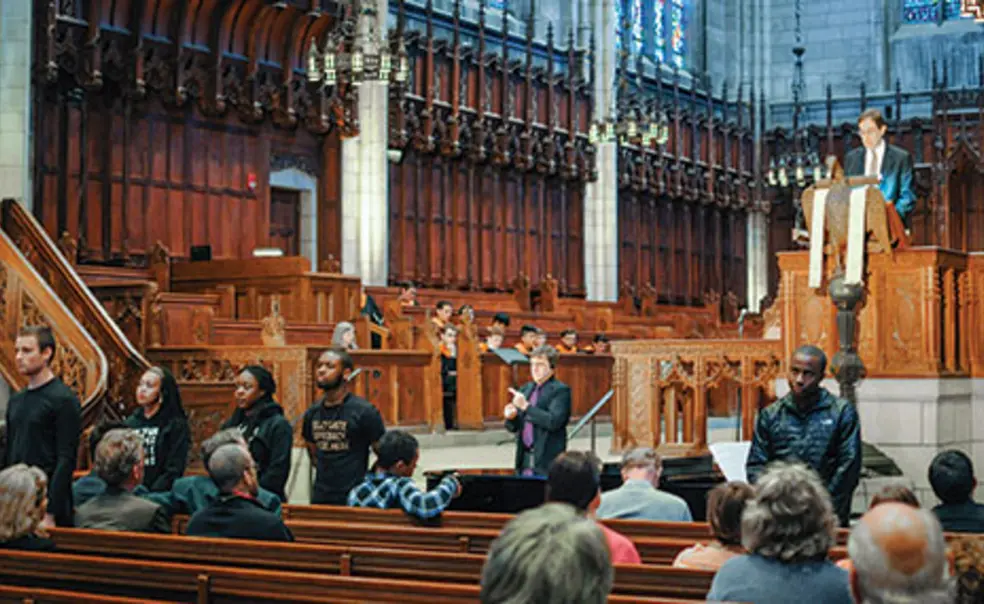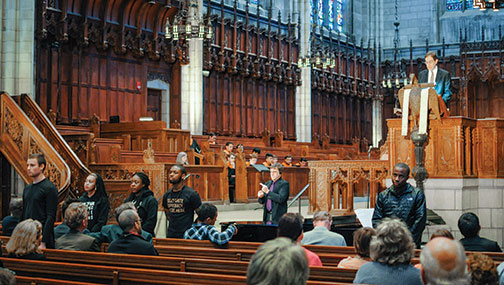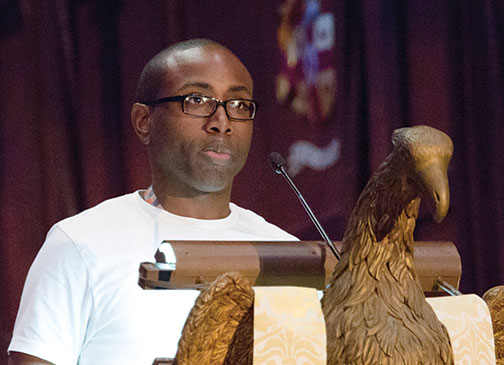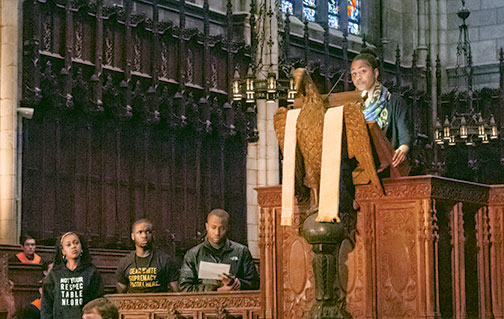Clash of Values?
At issue: Protecting free speech while providing a welcoming environment
Princetonians in early April found themselves debating how to live by values that seem essential to the life of a university but can come into conflict: freedom of expression, and having an environment that makes everyone feel safe.
The discussion developed as anger brewed over seemingly unrelated campus developments. First, after a student group called Urban Congo performed at a campus dance event, a video of the group was posted online showing the performers wearing loincloths and face paint as they drummed; many students considered the presentation demeaning to African and Native American cultures. Urban Congo quickly apologized and disbanded, but a discussion soon broke out among students on Yik Yak, a social-media platform in which users anonymously post and view comments. Some users singled out students who had been offended by Urban Congo, posting their initials and class years for everyone to see and making some students feel unsafe. Other posted comments suggested that students who thought Princeton was unwelcoming or racist simply should leave.
Meanwhile, a debate about this year’s main act for Lawnparties, Big Sean, also was erupting on social media. Two students started a petition urging that the concert be canceled because of lyrics that demean women and LGBT people (story on page 17).
President Eisgruber ’83 — a legal scholar who has written about constitutional issues — responded to the growing controversy with a statement that strongly endorsed freedom of expression while calling on Princetonians to “treat individuals, groups, and cultures with the dignity they deserve.”
He also implored community members “to live up to our ideals, to recognize the pain being felt by some members of our community, and to express ourselves in the veiled and dehumanized precincts of social media with the same care that we should bring to more personal interactions.” He ended with an invitation to a gathering in the University Chapel, which he hoped would “affirm the ties that bind us together” and lay the groundwork for dialogue.
But at the Chapel gathering April 12, which drew about 200 people, it quickly became clear that student concern and anger had not diminished and that some students were further angered by what they saw as a lack of understanding of what minority students were experiencing.
As Eisgruber rose to open the event, at least a dozen students rose as well, turning their backs and standing silently as he spoke about the environment for minority and LGBT students, starting with the hostile comments posted online. “These hateful comments have no place at Princeton. ... Because [the writers] are anonymous, we cannot know who they are, or how numerous they are. For those of us in the majority culture, it is tempting to dismiss these cowards as few in number, or unimportant. Not really us, in other words. But that overlooks a larger challenge, a challenge that those of us in the majority culture need to own and address.
“The taunts and insults of the last week have been hurtful not only because of what they have said, but because of the other experiences that minority students have had on this campus,” Eisgruber continued. “We have a responsibility to expand our perspectives and improve our campus climate, so that minority members of this community feel fully welcomed and so that the anonymous cowards find no fertile ground here for their hatred or their ignorance.”
In addition to Eisgruber, speakers at the Chapel were professors Ruha Benjamin (African American studies), William Gleason (English), and Carolyn Rouse (anthropology); Isaac Serwanga ’13, who works in the Princeton athletics department and who founded a mentorship group for black male athletes; Ph.D. student Eric Glover; Lina Saud ’15; Jacob Cannon ’17; and Naimah Hakim ’16. (Participants’ remarks will be published in the June 3 issue of PAW.)
Speakers shared their frustration and their desire to promote a climate of inclusion on campus. “We’re opting to wake up each morning and swallow a color-blind hallucinogen, numbing ourselves to the racial reality,” Benjamin said. “We’re playing dumb about the fact that humor and entertainment have always been the handmaidens of racism and sexism.”
Gleason said that “there are some things that I feel are very clear. For example, I think there is an important difference between using humor as a form of satire — in which the purpose is to critique a particular point of view in order to effect social or political change — and drawing humor out of a cultural impersonation in order to entertain. Humor can be a powerful social weapon, and, as we have seen, it can also be a divisive and deeply humiliating gesture.”
Hakim spoke toward the end of the event, inviting four other students to join her at the front of the Chapel. Together, they read a manifesto that called for honesty, respect, dignity and compassion, and accountability from the University.
“We believe that respect for human dignity should be valued no less than freedom of speech,” the statement said. “Freedom of speech is not a license for the daily verbal assault and hate speech that black students endure on this campus to a degree that no other student faces or will face in their time.”
About a dozen students stood in the center aisle holding signs with messages about racism and how Princeton responds to it. “[Racism] is fundamental to the life of any great university,” one sign said, attributing the quote to Eisgruber. His actual statement was: “Comedy, satire, and stage performances inevitably transgress boundaries. The controversies they provoke may be genuinely painful, but they are also fundamental to the life of any great university.”
When Hakim finished speaking, students walked out, chanting “hate speech is not free speech” in unison. Hakim did not respond to a request from PAW for comment about the protest.
Glover, an African American student who had spoken at the Chapel about his sense of alienation from Princeton and the University’s lack of diversity, explained later that students had felt Eisgruber’s initial invitation did not sufficiently address how the events on campus had created a hostile climate for many minority students. He said the president should have taken a stand to “hold people accountable for the offensive statements that they make,” suggesting that Urban Congo should have been required to explain its actions at the Chapel gathering. Glover added that he believes it is possible to uphold academic freedom “while still being able to formally acknowledge how students of color are feeling on campus.” Eisgruber did address the issue in his Chapel remarks, Glover said.
Both the Urban Congo and Big Sean controversies took place against the backdrop of a faculty vote April 6 to reaffirm Princeton’s commitment to free speech by adopting a statement drafted by faculty members at the University of Chicago that is gaining national acceptance (read the statement at paw.princeton.edu). The statement was incorporated into Rights, Rules, Responsibilities, the campus code of conduct.
“The whole point of the University is not to protect people from speech, but rather to challenge people to hear all sorts of opinions,” said mathematics professor Sergiu Klainerman, who presented the statement at the faculty meeting. Klainerman, who grew up in Communist Romania, told PAW that “more and more students at various universities are starting to misunderstand [the difference] between sensitivity to various issues and academic freedom.”
But the events on campus exposed a wide gap in perceptions of how freedom of expression might play out day to day.
“My reaction to Urban Congo was simple and straightforward: It was racist. It was wrong,” said Destiny Crockett ’17. Noting that every performance group needs spectators, she said that “it is less concerning to me that Urban Congo exists, and more problematic that they have an audience.”
For Angie Chiraz ’16, it was less obvious that the Urban Congo video was racist, but what was unambiguous was the hurt and offense experienced by her friends. Chiraz said she could not easily understand what African American students are experiencing, “but there are undeniably people in pain, so we have to take that seriously. If there’s a solution to the social unrest on campus, it begins with empathy.”
Princeton officials seemed to suggest that safeguarding both freedom of expression and a welcoming environment for all would be a long-term effort, and that the Chapel event was only the beginning. A few days after the Chapel meeting, Eisgruber described it as constructive and cathartic, adding: “I think that it was very important that different voices be represented in whatever way made them feel able to speak. I thought we were able to do that, and that was a good thing.”
A task force on diversity, equity, and inclusion could issue a report as early as this month. In the meantime, Eisgruber said, he hopes to continue to have campus discussions that will lead to an environment where students feel comfortable approaching people who are different from them.
He commended the USG for organizing an event that would give students a chance to discuss with faculty members the recently adopted statement on freedom of speech, and he noted that faculty members are planning discussions as well. The book chosen for the Princeton Pre-read, Whistling Vivaldi, addresses related issues (see page 7).
“In a University environment, we have lots of discussions and they can be uncomfortable,” Eisgruber said. “There are going to be continuing discussions and people talking in a lot of different places — that’s not something to remedy, that’s the heart of who we are.”















3 Responses
Betsy Kohl ’99
10 Years AgoRacial Issues and Free Speech
A profound thank-you to President Eisgruber ’83 and the Princeton faculty who reaffirmed Princeton’s commitment to protecting free speech (On the Campus, May 13). Throughout history, we’ve seen innumerable examples of why it’s not a good idea to persecute someone for the expression of an idea — any idea, no matter how offensive it seems. Take, for example, the idea that the Earth orbits the sun, or criticism of the monarchy or the ruling government. As a more recent hypothetical example, suppose that a journalist took pictures of the protests in Ferguson, Mo. Also suppose that publication of certain of those photographs was prohibited (and punishable) as offensive to a certain group — say, the protesters ... or the police. Where would artistic expression — or, quite frankly, reality — be then?
The problem with equating Naimah Hakim ’16’s concept of “human dignity” with “free speech,” and in doing so stating that some speech therefore can be prohibited, is that someone has to decide which humans are to be protected, what their “dignity” is that must be kept sacrosanct, and what the punishment is for those who transgress those boundaries — a fine, imprisonment, death? Most any viewpoint or expression can be seen by someone in society as offensive or insulting. It takes time and effort to provide an opportunity, as President Eisgruber did through the event in the Chapel, for dialogue to understand a particular viewpoint and explain to the one who expressed it why it is offensive to you. It is much easier, perhaps, as the students did, to turn your back and walk out, chanting (not listening) as you go. But it is the former that is so badly needed.
Bill Flury ’54
10 Years AgoRacial Issues and Free Speech
I consider the president’s use of the terms “majority culture” and “people of color” to be unfortunate and divisive. He should be encouraging a unified Princeton culture with no majority or minority. He also should recognize that we are all “people of color” — just different colors — and no one should be set apart as the standard.
John Griffin ’99
10 Years AgoRacial Issues and Free Speech
I am appalled by the conduct of the students who turned their backs on President Eisgruber. As a journalist, I have spent weeks at a time in both Ferguson, Mo., and Baltimore, where I got to know real people with real grievances willing to pay for their dissent by becoming the target of pepper balls and tear gas (and I, right along with them). But what is this ivory-tower teapot tempest about? A tone-deaf choice of costumes? Idiotic comments on social media? A dopey rapper?
With all of that as backdrop, I believe President Eisgruber acted swiftly and forcefully — if not somewhat indulgently — to ease students’ misgivings, reaffirm Princeton’s values, and embrace all Princetonians, even going so far as to invite students to an open forum. He was repaid for that invitation by what is, to me, clearly a form of maudlin mimicry carried out by young people only vaguely aware that such a thing is done, but clearly unaware of why it’s done — and in the process accomplishing little more than calling their manners into question. You learn as an adult — and clearly these students aren’t there yet — that just because it’s your right doesn’t make it right.